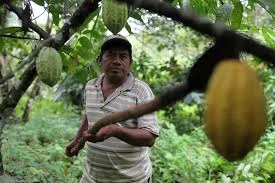November 2008, Belize. I am with a small group of journalists, taking them to meet the growers of organic cocoa beans. We go back 15 years - I first bought their cacao when Green & Black’s chocolate was just a baby.
When I first made contact with the Toledo Cacao Growers Association, the Maya Indians faced abject poverty after throwing in their lot with US chocolate giant Hershey. A classic old-development paradigm: the aid workers had encouraged the growers to sign up to intensive farming and the break-up of their communal reservation land. The private land deeds were used as collateral for bank loans to buy hybrid seeds and agrichemicals. Then the aid workers left, Hershey pulled out and prices dropped from $1.75 a pound of beans to a catastrophic 55¢ a pound. The bank was readying to foreclose and confiscate farmers’ land. That’s when Josephine and I turned up, prepared to pay decently, with a five-year rolling contract and cash up-front for organic cocoa beans. I blame the ‘kukuh’. That’s what turned me and Josephine on to the beauty of Belize Maya cocoa and led to Maya Gold, the first product in the UK to be certified Fairtrade. Now I am sitting with Eladio Pop and his wife after a dinner of tortilla, spicy stew and pumpkin, and it’s kukuh time again. It’s all home-grown and homemade. After harvesting his cacao, Eladio ferments it, dries it, roasts it, winnows the husks and grinds them, then shapes the resulting paste into balls. He grates some, blending it with warm water, vanilla, ground allspice and honey or sugar to make kukuh. After several delicious calabash cups-full, we are bouncing off the walls. Later I bump into an old friend, Cirila Cho when she is picking up a cheque for her home-made chocolate bars. A new grandmother, she’s now a businesswoman in her own right, with a small-scale grinding and conching set-up. Organic cocoa is good for women. After the men bring back the pods to the village, the women ferment the beans in boxes for five days. Then they sun-dry them, turn them as needed, and bring them in if it starts to rain. Controlling these operations gives women a share in the wealth, conferring domestic and community power. The Maya-run cacao cooperative is doing well. I attend its AGM, where everyone gets a bar of ‘their’ chocolate, and hears the accountant report another profitable year. Asset-rich, the coop now has enough reserves in the bank for a disaster reserve fund (hurricanes and fire) and high school scholarships. The number of kids at secondary school has grown from 10% to over 70%, thanks to our paying fair-trade and organic prices. The Minister of Foreign Affairs is speaking now, praising the farmers. Thanks to their vision, he says, Belize, the birthplace of fair trade, is a beacon to the world. It sounds grand but it wasn’t all plain sailing. Back in 1993, British and UN aid workers strongly advised the cacao growers against signing-up to produce for Green & Black’s Maya Gold. They especially counselled against going organic, predicting disease and crop failure. However, since we were offering three times the price and a return to traditional Maya farming practices without expensive chemicals, it was a no-brainer. Nevertheless I will always be grateful to Justino Peck, the then - and just re-elected - Chairman of the association, for listening to my scheme and trusting me to deliver. I visit a three-generation farm, the Bols, Grandad Reyes, son Justiniano and grandson Justiniano Junior, where we eat ripe cacao fruit, with just the right au point balance of sweetness and acidity. We eat greedily, our sticky fingers pulling out the seeds, sucking off the pulp and spitting out the beans. This is a rare treat, a fruit that can never be commercialised – take an eco-cacao holiday in Belize and this pleasure can be yours! You can’t produce organic cocoa beans on a big plantation paying slave wages. The only way is on small family farms paying a decent price to get the commitment and care required for a high-quality product. Shoppers often agonise: organic or fair-trade? Support organic farmers and you get both.











